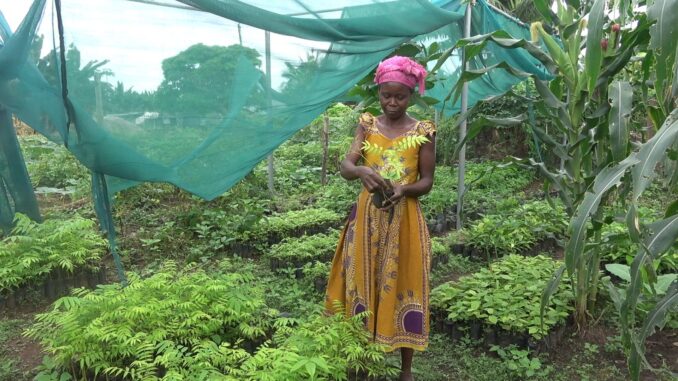
Faustina Amponsah sought help combating the effects of climate change in her farming community. So she linked up with a local environmental group to grow and distribute tree seedlings in her community. She’s confident the reforestation will bring back the regular rains.
By Michael Sarpong Mfum
Despite the lack of rainfall in a once bountiful region, Faustina Amponsah shows off a lush nursery of tree seedlings on her farm plot in Faaman, a rural farming community in Bono East, Ghana. When a changing climate affected her farming activities, she turned to local organisations to reclaim her livelihood.
“We have received seedlings from EcoCare Ghana to plant to help restore the destroyed forests in the area. When the trees grow, I believe it will increase the rain pattern. The seedlings are free and we are planting them. This will go a long way to improve our farming activities,” Amponsah explained eagerly.
Amponsah lives in the transitional region of Ghana. In the past, the region supported intense crop cultivation due to favourable rainfall patterns and its forest/savannah surroundings. Of late, however, communities like hers have been significantly affected by climate change.
“The challenge is that when I plant my maize, I do not get enough rain for the maize to grow. At this time that we have planted our maize there should be rain but we are not getting it. This has come because of illegal logging and this has affected the rainy pattern,” Amponsah said.
One of the notable effects experienced by farmers in these communities is the alteration of rainfall patterns. They have been experiencing late rains, which are far from optimal, as rain-fed crops need on-time and regular rainfall. Moreover, when the rains do arrive, they are irregular, making it difficult for farmers to plan and implement their agricultural practices effectively.
“As we speak, we are supposed to plant our yam but we are unable to plant because we are not getting the rains. We are late in planting. I do not think I can get good yields this year. That is the situation at hand,” Amponsah disclosed.
These changes in rainfall patterns have led to reduced agricultural yields compared to previous years. The irregularity and unpredictability of rainfall have disrupted the farming calendar and affected crop growth and development. As a result, farmers are facing challenges in achieving high crop yields and are experiencing decreased productivity.
Amponsah and other farmers in her community have taken on the fight against climate change by partnering with local organisation EcoCare Ghana. The NGO is a rights-based campaign and advocacy organization working in the environmental conservation field.
One of EcoCare’s projects is the Landscapes and Environmental Agility Across the Nation (LEAN) Programme. This is a four-year project (2020-2024) funded by the EU through an initiative that aims to conserve biodiversity, build climate resistance, and reduce carbon emissions from land use changes in the savannah, high forest, and transitional regions..
Amponsah received the seedlings free of charge. She is currently the only beneficiary under the LEAN program to grow and also distribute the seedlings in her area.
“Apart from this, we have been trained in other alternative livelihoods such as snail rearing, beekeeping, and livestock rearing. We are so happy because we will get income from it,” she explained.
Two other farmers involved in EcoCare’s training shared the challenges they face as a result of climate change and how they are helping to tackle them.
Peprah Gyau is a farmer based in Faaman, the same community as Amponsah.
“The impact of climate change is dire. When the rains do not come our crops wither and die. When the rains also come, they destroy things. Because of climate change, we have to spend more on fertiliser, which increases the cost of production,” Gyau explained.
In the neighbouring Nkwaeso community, farmers are engaged in the cultivation of maize, cashew, and yam.
Amponsah also distributes her seedlings to Nkwaeso, where Kwabena Afena, a 38-year-old male farmer, resides.
“I grow yam and maize. This year we did not get the rain to grow our yam. We didn’t get the rains even to prepare our fields. We used to grow maize twice a year but things have changed. Even once we grow there is a challenge because there is irregular rainfall,” Afena, disclosed.
Amponsah has persuaded Afena to start planting trees in his community.
“As a way of fighting climate change, through the help of EcoCare Ghana, we are planting seedlings to help in the restoration of the degraded forest. We have also received training in alternative livelihoods in snail rearing, beekeeping, and aquaculture,” Afena explained.
The government of Ghana has also taken a proactive stance in combating climate change through the introduction of a project called Green Ghana. This initiative involves the annual distribution of over ten million seedlings, free of charge, to be planted across all sixteen regions of the country.
In addition to governmental efforts, organisations like EcoCare aim to empower farmers in the implementation of sustainable agricultural practices to mitigate the effects of climate change.
Project Officer at EcoCare Ghana, Enock Danso Okyere disclosed that farmers within the transitional region of Ghana have been sensitised to climate change and have also been trained in alternative livelihoods.
“We all know the impact of climate change. Because of this food production has been low in the transitional region which is the food basket of Ghana over the last years. We have therefore trained the farmers in smart agriculture that will not destroy the environment. Additionally, by training them how to grow seedlings, we have encouraged the farmers to grow trees in their farms and along river bodies,” Okyere said.
“We have trained many farmers in alternative livelihoods in areas such as snail rearing, beekeeping, and aquaculture. This is to help farmers whose farming activities have been affected by climate change, to get another channel income,” Okyere said.
bird story agency
